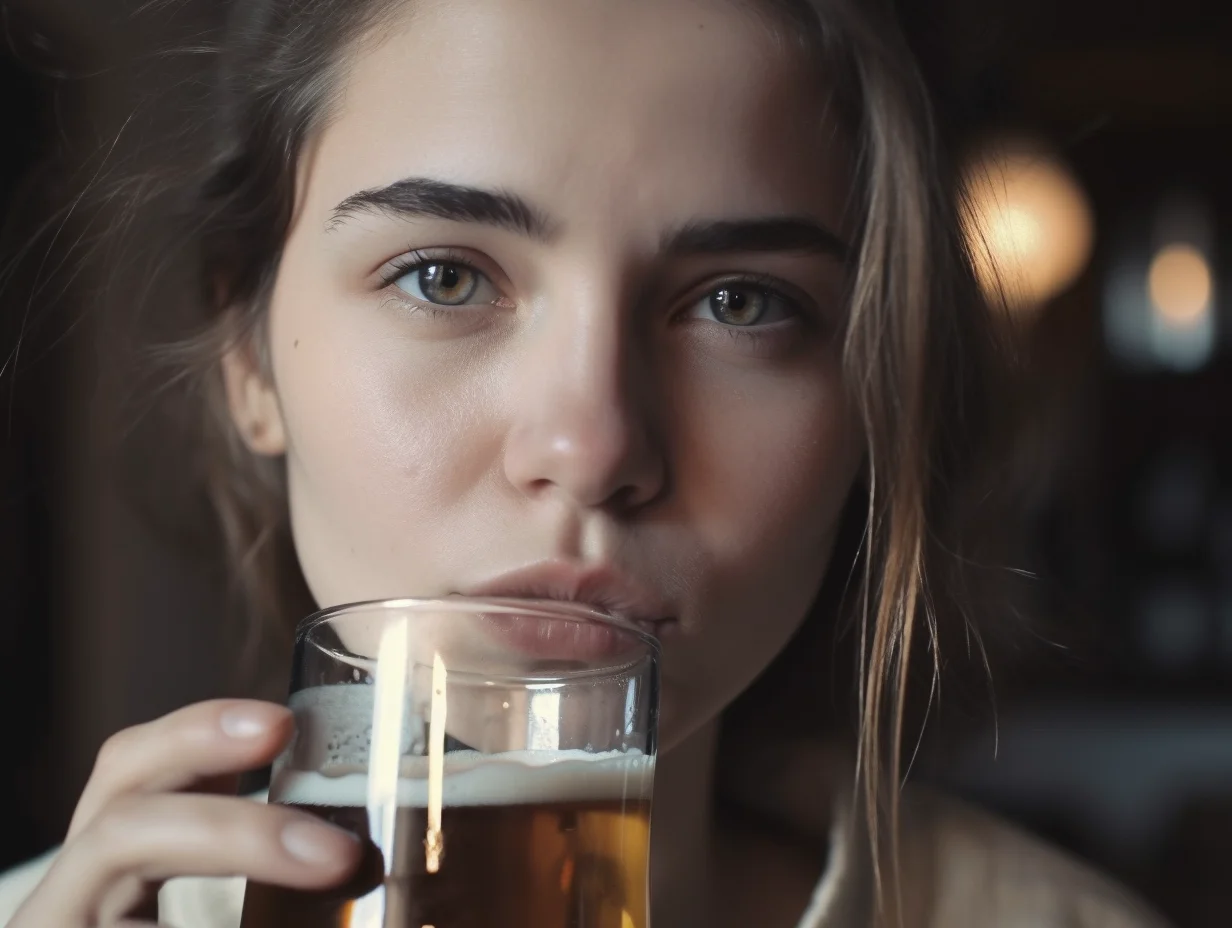Could acne and alcohol be related?
Picture this: You’ve just come back from a fabulous night out with friends, having sipped on a few glasses of your favorite drink. The next morning, you wake up to find a few pesky pimples have popped up on your face. Coincidence? Or could there be a link between your alcohol consumption and those unexpected breakouts?
Let’s dive in and explore the possible connection between alcohol and acne, so you can make informed decisions about what you put into your body and how it might affect your skin. But remember, your skin is unique, and what affects someone else’s complexion might not have the same impact on yours. Keep this in mind as you read on, and always listen to what your skin is telling you.
Exploring the link between alcohol and acne flare-ups
When trying to uncover the connection between alcohol and acne, it’s important to understand the science behind it. While you might be quick to blame the alcohol itself, there’s more to this story than meets the eye.
Inflammation
Alcohol is known to cause inflammation throughout the body, including your skin. This inflammation can lead to redness and swelling, making pre-existing acne more noticeable and even exacerbating breakouts.
Hormonal Imbalance
Drinking alcohol can cause hormonal fluctuations, particularly in women. When your hormones are out of whack, your skin may produce more oil than usual, which can lead to clogged pores and acne flare-ups.
Dehydration
You know that feeling after a night out when your mouth feels like a desert? That’s because alcohol is a diuretic, causing you to lose fluids and leading to dehydration. When your skin is dehydrated, it may overcompensate by producing more oil, once again contributing to breakouts.
Poor Sleep
It’s no secret that alcohol can mess with your sleep quality. Poor sleep has been linked to an increase in stress hormones, which can worsen acne and other skin conditions.
Nutrient Deficiencies
Consuming alcohol can interfere with the absorption of essential nutrients, like zinc and vitamin A, that are crucial for maintaining healthy skin. A lack of these nutrients could potentially make your skin more susceptible to acne.
The hormone-alcohol-acne triangle
Navigating the complex relationship between hormones, alcohol, and acne can be a bit of a puzzle. But understanding this interplay is key to unlocking the mystery of why you might be experiencing breakouts after a night of indulgence. So let’s connect the dots and explore the hormone-alcohol-acne triangle.
Alcohol and Hormone Imbalance
As we touched on earlier, alcohol can cause hormonal fluctuations, especially in women. Drinking can increase estrogen levels, which may contribute to acne by stimulating oil production and clogging pores. This is particularly true for those who are already prone to hormonal acne, such as breakouts that occur around your menstrual cycle.
Stress Hormones
Alcohol consumption can lead to the release of stress hormones like cortisol. Elevated cortisol levels have been linked to increased sebum (oil) production, which can clog your pores and result in acne breakouts.
Insulin Resistance
Drinking alcohol can cause blood sugar spikes, which in turn may lead to increased insulin levels. Higher insulin levels can trigger the production of skin cells and sebum, creating an environment where acne-causing bacteria can thrive.
As you can see, there’s a complex interplay between hormones, alcohol, and acne. While alcohol may not be the sole culprit behind your breakouts, it can certainly play a role in exacerbating existing acne or triggering new flare-ups, particularly for those with a predisposition to hormonal acne.
Inflammation: alcohol’s role in your skin’s health
Inflammation is a natural response in your body, designed to protect you from harmful stimuli like injury, infection, and toxins. However, chronic inflammation can lead to a myriad of health issues, including skin problems like acne. Let’s take a closer look at how alcohol contributes to inflammation and its impact on your skin’s health.
Pro-inflammatory Molecules
When you consume alcohol, your body breaks it down into a compound called acetaldehyde. This compound can trigger the release of pro-inflammatory molecules called cytokines, which can cause inflammation throughout your body, including your skin. This inflammation may result in redness, swelling, and potentially worsening acne breakouts.
Dilated Blood Vessels
Alcohol is a vasodilator, meaning it causes blood vessels to expand. This can lead to facial redness and flushing, which may exacerbate the appearance of acne and other skin conditions like rosacea. Over time, excessive alcohol consumption can also damage blood vessels, making inflammation and redness more persistent.
Weakened Skin Barrier
Your skin’s barrier function is essential for keeping irritants and bacteria out and locking moisture in. Alcohol can disrupt this barrier, making your skin more vulnerable to inflammation and acne-causing bacteria. A weakened skin barrier can also lead to dryness and irritation, further exacerbating acne and other skin issues.
While enjoying a drink or two may not cause immediate harm, it’s essential to be aware of how alcohol-induced inflammation can affect your skin’s health in the long run. If you notice that your acne worsens or your skin becomes more sensitive after drinking, consider moderating your alcohol intake and focusing on anti-inflammatory foods and skincare products to help keep your complexion calm and clear.
Dehydration: alcohol’s sneaky way of affecting your skin
We all know that staying hydrated is essential for our overall health, but did you know that dehydration can have a significant impact on your skin, too? Alcohol is notorious for causing dehydration, and it can be a sneaky culprit behind skin issues like acne. Let’s examine how alcohol-induced dehydration affects your skin and what you can do to counteract it.
Overproduction of Oil
When your skin is dehydrated, it may overcompensate by producing more oil. This excess oil can clog your pores, leading to breakouts and a greasy appearance. By staying properly hydrated, you can help maintain your skin’s natural oil balance and minimize the risk of acne flare-ups.
Dull Complexion
Dehydrated skin can appear dull, lackluster, and even flaky. A lack of moisture can also exacerbate the appearance of fine lines and wrinkles. By keeping your skin hydrated, you’ll promote a healthy, radiant complexion.
Impaired Skin Barrier
Dehydration can weaken your skin’s barrier function, making it more susceptible to irritation and acne-causing bacteria. A strong, healthy skin barrier is essential for protecting your skin from external aggressors and maintaining a clear complexion.
To counteract the dehydrating effects of alcohol, make sure to drink plenty of water, especially when you’re indulging in your favorite libations. Aim for a 1:1 ratio, drinking one glass of water for every alcoholic beverage you consume. In addition, consider incorporating hydrating skincare products, like hyaluronic acid serums and nourishing moisturizers, into your routine to help maintain your skin’s moisture levels and support a healthy skin barrier.
Are some alcoholic beverages more likely to cause acne?
While alcohol, in general, can contribute to acne through the mechanisms we’ve discussed, you might be wondering if certain types of alcoholic beverages are more likely to cause breakouts than others. Let’s explore some common drinks and their potential impact on your skin.
Sugary Cocktails
Those delicious, fruity cocktails can be loaded with sugar, which can cause blood sugar spikes and inflammation. High sugar intake has been linked to acne, so it’s wise to limit these types of beverages if you’re prone to breakouts.
Beer
Beer contains yeast and carbohydrates, which can potentially worsen acne for some people. Additionally, beer’s high glycemic index can contribute to blood sugar imbalances and inflammation, further increasing the risk of breakouts.
Red Wine
Red wine is rich in antioxidants, which can be beneficial for your skin. However, it also contains histamines and tannins, which can cause inflammation and redness for some individuals, potentially exacerbating acne.
White Wine
White wine tends to have less histamine content than red wine, but it is still acidic and can cause blood sugar fluctuations. While it may not be the worst offender, it’s important to consume it in moderation.
Clear Liquors
Clear liquors, such as vodka or gin, are lower in sugar and additives compared to other alcoholic beverages. While they can still cause dehydration and inflammation, they might be a better option if you’re looking to minimize the potential impact on your skin.
Remember that everyone’s skin is different, and what may trigger acne in one person may not affect another. The best approach is to pay attention to how your skin reacts to different types of alcohol and adjust your choices accordingly
Balance: the golden rule for enjoying alcohol and clear skin
From inflammation and dehydration to hormonal imbalances and liver function, it’s clear that alcohol consumption can play a role in the appearance of your skin. However, the key takeaway here is balance.
It’s important to remember that enjoying a drink or two doesn’t automatically doom you to breakouts and skin woes. The golden rule for maintaining clear skin while still savoring your favorite alcoholic beverages in moderation and mindfulness. Here are some tips to help you strike that perfect balance.

